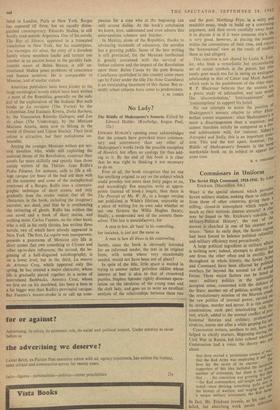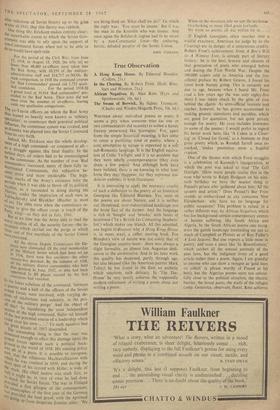Commissars in Uniform
The Soviet High Command, 1918-1941. By J°113 Erickson. (Macmillan, 84s.) WHAT is the special element which pervades Soviet military studies, making them so different from those of other countries, giving them 3 stifling, closed-in atmosphere which repels as much as their intrinsic interest attracts? A cluf may be found in Mr. Erickson's sub-title, Military-Political History'; the rest of the answer is sketched in one of his shortest sen- tences: 'Since its early days, the Soviet regime had been forced to balance political reliability and military efficiency most precariously.' A large political ingredient in military gairS is nothing new; indeed, attempts to divorce thet one from the other often end in sterility. HO throughout its whole history, the Soviet Al and Command have been affected by overlays far beyond the normal lot of arnica, forces. Three major factors can be listed
once: military politics in the universali3;
accepted sense, concerned with the defence °Lf the State; another set of politics, arising °ILL °A; the revolutionary mission of the Marxist creeuo the raw politics of internal power, carried °le by intrigue, murder and terror. It is this unighe combination, each part interlocking with the rest, which, added to the normal conflict of Pr , frivalries, e s s io na etheories one aftera n and ordinary ao while nt lac r gasping a s ppirnogf eP;s:cioarati.. Communist writers, needless to say, have not helped to clarify matters. Beginning during •.4 Civil War in Russia, but later echoed where v`ot Communism mt unism had a voice, the theory was put about that there existed a 'proletarian science of •,ahat that the Red Army was employing it and The here here lay the secret of its success. • • : ble supporters of this idea included the ineotaubt number of extremists, but there is no d°they that . . . the conviction was —the Red commanders, self-taught and boaw io tested - were devising something quite n- with the history of warfare, and waging warA r ril y a unique military instrument, the Red "•
In fact, Mr. Erickson reveals, vast, de'
as his vaa tie tailed, but absorbing work passes 'vilest°
growing that tor THE SPECTATOR, SEPTEMBER 28 after milestone of Soviet history up to the grim Winter of 1941, that this theory was rubbish.
One thing Mr. Erickson makes entirely clear: the remarkable extent to which the Soviet Gov- ernment was able to rely upon the support of non-Communist forces when not to be able to do so would have spelt ruin.
For the period of the Civil War, from June 12, 1918, to August 15, 1920, [he tells us] no fewer than 48,409 ex-officers were taken into the Red Army, with 10,339 of the military- administrative staff and 214,717 ex-NCOs. By stark comparison, in 1918 the command courses for 'Red Commanders' passed out 1,753 quali- fied candidates. . . . For the period 1918-20 a grand total of 39,914 'Red commanders' pro- ceeded to the Red Army. Their total did not meet even the number of ex-officers, leaving aside any qualitative comparisons.
The ex-Tsarist officers on whom the Red Army thus leaned so heavily were known as 'military specialists'; to counteract theirpotential political influence, the commissar system was created, and so disunity was planted into the Soviet Command from its very birth.
Indeed, Mr. Erickson sees the whole develop- ment of a high command—or command at all— as a stru
ggle against this fatal duality. In the earliest days, all orders had to be countersigned by the commissar. As the number of true 'Red commanders' increased, many of them fully in- aectrinated Communists, this subjection be- ame more and more intolerable. The high- Water marks of the Army's existence were the Periods when it was able to throw off its political TLe b u s, as it succeeded in doing during the onirties under the inspiration of such men as fkhachevsky and .Blyukher (Blucher to most Lis). The ebbs were when the commissars re- pion-led to give the officer. corps 'a touch of the artY Whip'---as they did in July, 1941. Rut at no time was the Army able to shed the worst •
Incubus of all, the security forces—the in- i',u'untent which carried out the purge in which "'ere executed. out of five marshals of the Soviet Union "ere executed.
All the eleven Deputy Commissars for De-
fence were eliminated. Of the total membership of the Military Soviet which had been set up in 1934, there were five survivors—the other seventy-five perished.. By the summer of 1938, ail the military district commanders who held that position in June, 1937, or who had been appointed (.0 fill places vacated by the first executions had vanished. an the lower echelons of the command, 'between armed and a half of the officers of the Soviet
gre forces were involved, with varying de ewes of misfortune and calamity,
s of the in the pro military purge.' And the object of section 'In liquidating the most independent of Inn of the high command, Stalin 'rid himself eoullne last potential source of a leadership which the d rival his own.. . To such squalors had „great dream of 1917 descended. demented astounding atmenled e thing is that the man was _oued fore__
enough to effect this damage upon the forces against such a political back nd as the world of 1938. His ensuing policy
aow• ail of a piece. It is possible to recognise, • ,_that the villainous Machiavellianism with shol;n he was credited in 1939, and during the the span of his accord with Hitler, is wide of 111. ark. His chief motive was stark fear, as to wt. it might be, in view of what he had done orovirdeck the Soviet forces. The war in Finland the c ed a first glimpse of the consequences; • alastrophes of the first year of the Cierrna0 cry Going tap the final proof, with the agonised bullig up From desperate frontier units : 'We
are being fired on. What shall we do?' To which the reply was : 'You must be insane.' But it was the man in the Kremlin who was insane. And once again the Bolshevik regime had to be saved by a non-Communist force—the enduring, heroic, deluded peoples of the Soviet Union.
JOHN T ERRA1NE



































 Previous page
Previous page